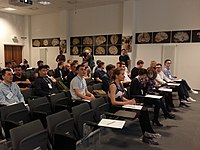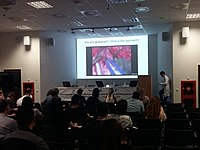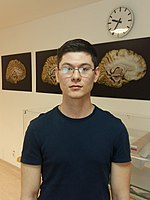Students compete in second international Neurosurgery Olympiad in Tyumen, Russia
Monday, May 6, 2019
The second International Student Olympiad in Neurosurgery for the prize of the Governor of Tyumen Oblast, Russia took place in the first week of April at the Federal Center for Neurosurgery in Tyumen. The competition was attended by 46 people from cities within Russia as well as from Aktobe, Kazakhstan. Wikinews attended the event, and talked to some of those involved.
This was the second consecutive student Olympiad in neurosurgery. Six of the country's eight federal district capitals were reportedly scheduled to send contestants. The winners are awarded free tuition at the academic department of Neurosurgery at First Moscow State Medical University (First MSMU), also called Sechenov University.
Madina Bizheva, in her fourth year at Kabardino-Balkarian State University, won this second Olympiad. The other two places at Sechenov University were awarded to Oleg Titov, fifth year at the First MSMU, and Irina Borovikova, fifth year at Ural State Medical University. Bizheva said: "I give my victory to my mother, who inspired me to study at a neurosurgeon. After she had a stroke, the dream of becoming a doctor began to turn into reality. I was seriously preparing for the Olympiad. One hand rocked the child, the other held a book on neurosurgery. If a person strives for and desires something, then everything will work out." ((ru))Russian: Свою победу я дарю маме, которая вдохновила меня пойти учится на нейрохирурга. После того, как у нее случился инсульт, мечта стать врачом стала превращаться в реальность. Я серьезно готовилась к олимпиаде. Одной рукой покачивала ребенка, другой держала книгу по нейрохирургии. Если человек к чему стремиться и чего-то очень желает, — все получится.
-
Contestants came from many parts of Russia and from Kazakhstan.
Image: Дмитрий Кошелев. -
Participants waiting for the start of the test.
Image: Дмитрий Кошелев. -
Olympiad participants complete a theory test.
Image: Дмитрий Кошелев.
The chairman of the organizing committee of the Olympiad and the head physician of the center, Albert Sufianov, is also the head of the academic department of neurosurgery in the First MSMU. The three best performers in this contest are awarded the opportunity to study for free in his department in the residency of the Sechenov University.
The event was supported financially by Tyumen Oblast. The new governor of the region, Alexander Moor, during his message to the regional parliamentarians read out on November 22, just offered to diversify the economy, reducing the focus on oil and gas from the third Baku and cultivating medical tourism: "Now the annual volume of our exports — non-row materials and non-energy — has come close to a billion dollars. In the next year, this must be given priority. And here, too, non-standard approaches will be required, in which trends of various origins will organically merge across the traditional industry nomenclature. For example, it is time to perceive Tyumen medicine as a full-fledged export-oriented industry, while closely associated with the tourism business. Medical tourism is growing rapidly all over the world, and in terms of price and quality, Tyumen is more than competitive — if not on a global scale, then on a scale of the whole continent Eurasia exactly. Here the themes of several national projects intersect at once!" ((ru))Russian: Сейчас годовой объем нашего экспорта – несырьевого и неэнергетического – вплотную приблизился к миллиарду долларов. В следующем году этот вес надо взять. И тут тоже потребуются нестандартные подходы, в которых поверх традиционной отраслевой номенклатуры органично соединятся тренды различного происхождения. Скажем, тюменскую медицину уже пора воспринимать как полноценную экспортно-ориентированную отрасль, при этом тесно связанную с туристическим бизнесом. Медицинский туризм бурно растет во всем мире, а по параметрам цены и качества Тюмень более чем конкурентоспособна – если не в глобальном масштабе, то в масштабе всего евразийского континента точно. Здесь пересекаются тематики сразу нескольких национальных проектов!

Image: Дмитрий Кошелев.
According to Professor Sergey Dydykin, who is both co-chairman of the organizing committee and head of the academic department of operative surgery and topographic anatomy of the First MSMU, in the United States and Europe it is not customary to teach manual skills, such as manual surgical techniques, to undergraduates; conducting surgical competitions for students is a Russian practice.
During the Olympiad, students had to perform simulated practical tasks. For example, in the final part of the competition, the contestants had to mill away the shell of a raw egg without damaging the membranes beneath. This exercise simulates endoscopic drilling.
According to Sufianov, the Olympiad shows young people the "social elevators" available to them. He suggesnted student Ibrahim Salamov as an illustration of his words. A year ago, this native of the Dagestan village took first prize, and he is now one of the organizers of the Olympiad.
Regarding which part of the competition was most difficult for aspiring neurosurgeons, Sufianov said it was English language. From his view, this is a nationwide problem in Russia — there are many skilled surgeons in the country, but their knowledge of foreign languages is not very strong. In his opinion, a specialist has almost no chance to become a very high level professional without knowledge of English.
Alexander Gagay of Yekaterinburg, who took third place last year, is currently a fourth year student at Ural State Medical University. This year, he said, he came to support his fellow Yekaterinburgers. In his opinion, the most difficult part was the theoretical tasks, and not English. In his view, the federal neurosurgery centers like Tyumen created within the framework of the national health project are on the same level with their foreign counterparts. In his view, there are strong opportunities to become a very good specialist without leaving Russia.
Several people returned to the Olympiad after attending last year. One is Denis Kovalchuk, a sixth year student at Buryat State University. He said he was interested in neurosurgery from the first year, but in his home region there are no suitably equipped facilities as there are in Tyumen. Kovalchuk also said that, after the first Olympiad, a community of young neurosurgeons emerged on social networks, numbering about 400 people. Students exchange professional literature in it and give each other tips for use in practical situations.
-
Ibrahim Salamov, last year's winner.
Image: Дмитрий Кошелев. -
Alexander Gagay, who took third place in 2018.
Image: Дмитрий Кошелев. -
Denis Kovalchuk, a 2-year participant.
Image: Дмитрий Кошелев.
This year, the jury decided two participants in addition to the official winners performed at such a high level and Albert Sufianov provided them with his personal grant for residency training at First MSMU. These were Ivan Shelyagin and Valentina Sidorenko from Tyumen State Medical University.
Sources
- "В Федеральном центре нейрохирургии в Тюмени стартовала международная студенческая олимпиада по нейрохирургии на приз губернатора Тюменской области" — Federal Center of Neurosurgery (Tyumen), April 02, 2019 (Russian)
- "В Тюмени стартовала олимпиада по нейрохирургии на приз губернатора" — Тюменская линия, April 03, 2019 (Russian)
- "Определены победители международной студенческой олимпиады по нейрохирургии: вместо трех – пять призеров" — Federal Center of Neurosurgery (Tyumen), April 04, 2019 (Russian)
- "Послание губернатора Тюменской области 2018" — Правительство Тюменской области, November 22, 2018 (Russian)










